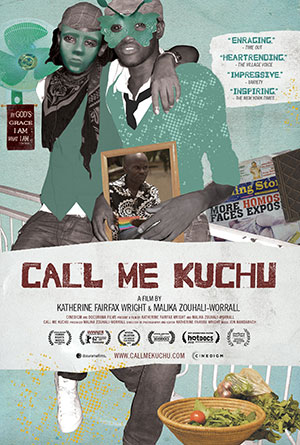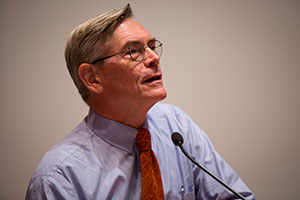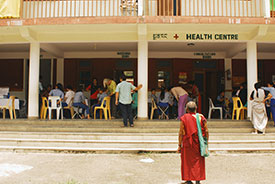

Einstein’s Efforts Worldwide
Global Health Week 2016 Highlights Issues and Efforts
With 36 initiatives in 20 countries, involving 90 student and 45 faculty participants each year, Einstein’s Global Health Center demonstrates the College of Medicine’s mission to meet the healthcare needs of all people, including those in underserved communities. Each fall, the center presents a roster of horizon-expanding activities to the Einstein community during Global Health Week. Highlighted by two special events?the screening of the Ugandan documentary “Call Me Kuchu,” with one of its directors on hand for discussion afterwards; and guest speaker Donald McNeil, Jr., global health reporter for the New York Times? this year’s observance took place September 26 through 29 and was organized by the center’s program manager, Jill Raufman, who also is director of medical student global health programs, along with board members of Einstein’s Global Health Club.

Movie poster from the film “Call Me Kuchu”
Film Screening and Discussion
During the past decade, Einstein students have gone to a couple of sites within Uganda on global health fellowships. In Ugandan hospitals, several witnessed homophobia toward patients. What they saw led them to bring the 2012 film “Call Me Kuchu” and co-director Malika Zouhali-Worrall to Einstein.
“Kuchu” is a Swahili label for homosexuals; in Uganda, as in many parts of the world, homosexuality is highly stigmatized. The hour-and-a-half documentary explores the struggles of the LGBT community in Uganda, focusing in part on the 2011 murder of LGBT activist David Kato. After the screening, Ms. Zouhali-Worrall described the making of the movie and answered questions.
Insights from Abroad
Mr. McNeil specializes in “plagues and pestilences,” as he put it. In his engaging and wide-ranging speech, “Sex, Albino Murders, Drone Strikes, Tightwad Superpowers and the Battle for Global Health—Plus Zika,” he described what he’d learned from assignments abroad. For example, he advised students who travel to “always ask patients if they’re seeing another practitioner.” He said this was necessary since local caregivers often prescribe purging—which means that medications taken orally never reach their target.
He also related how patients may have fears that students don’t know about, citing a religious group that insisted polio vaccinations would cause infertility because the word “Sterile” was on the box.

Guest speaker Donald McNeil Jr., from the New York Times
And he shared examples illustrating the different values, beliefs and understanding that patients may have. In one instance, a woman thought she got sleeping sickness because she hadn’t borne enough children. In another, a pregnant woman in a Zika-afflicted country said, “God will make his head grow” upon viewing an ultrasound scan showing a baby with a small head.
In sum, Mr. McNeil suggested that medical students thinking of working in poor countries should expect the unexpected.
Some Perennial Favorites
The week’s events also included three offerings that prove popular each year—a meet-and-greet with global health faculty, a panel discussion featuring student travelers and a photo exhibit along Einstein’s “Main Street” showcasing the locales the students traveled to, the people they met and their cultural experiences.
At the gathering with faculty members, approximately 50 first-year M.D. students learned how they could take part in clinical, public health or research experiences in low-income nations. Students circulated among faculty members, who described their global research projects and related opportunities for students to participate. The evening’s introductions were made by Dr. Louis Weiss, co-director of the Einstein Global Health Center, and professor of pathology and of medicine (infectious diseases at Einstein, as well as an attending in infectious diseases at Montefiore).
During the panel discussion, second-year students who had gone on global health trips in locations ranging from Asia and Africa to South America and the Caribbean shared their experiences with first-years.
“While traveling in the Indian Himalayas, I experienced my first true exposure to forms of non-western medicine, specifically from Tibetan and Ayurvedic practitioners,” said Chase Moon, Class of 2019, who organized the event as a board member of the Global Health Club. “Patients used the prescriptions and medications that these healers provided, and these same patients also wanted the help of ‘western’ medicine.”

View the photo gallery of the Global Health Week exhibitHe added, “Observing this was a good reminder that a physician should always be open-minded about what is going to best meet the goals of the patient. This was just one of many lessons we learned from other students, doctors, nurses and social workers about the qualities essential in a physician as we experienced different cultures.”
Culminating with a Global Health Conference
The photo exhibit, which opened the following Wednesday, on October 5, will remain on view through Monday, December 5, when the Global Health Center hosts its third biennial global health conference. The all-day event will focus on ethical and logistical issues in advancing global health. Speakers and guests will gather in Einstein’s LeFrak Auditorium, at the Price Center/Block Research Pavilion, where thought leaders from around the world will share their insights and experiences, meet new colleagues and formulate strategies to improve global health programs.
Registration for the conference is under way. Interested individuals should visit http://www.mecme.org/ and address questions to Ms. Raufman at global@einstein.yu.edu.
Posted on: Friday, November 18, 2016

Tablet Blog